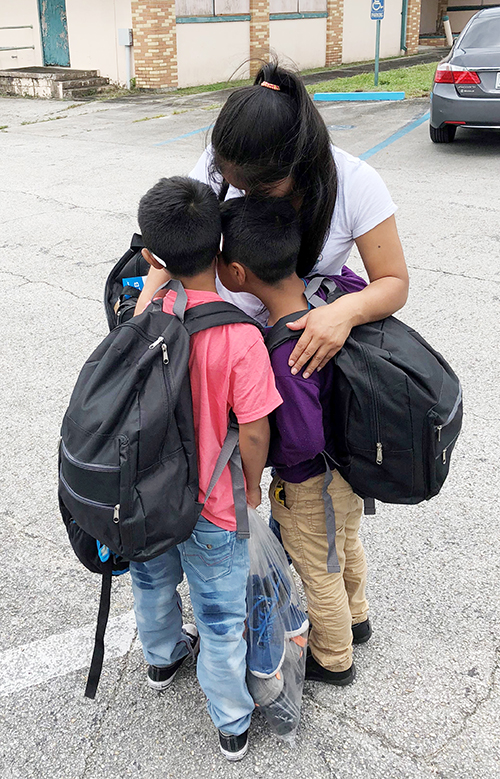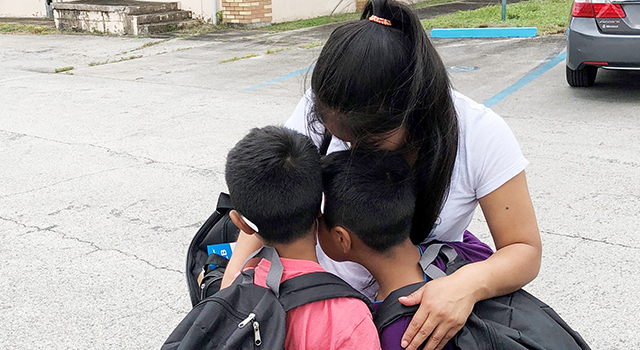By Rocio Granados - La Voz Catolica
MIAMI | After a 49-day separation, Maria was reunited with her children, ages 7 and 8, in Miami.
“It was a great joy. The most beautiful thing,” said Maria, whose name has been changed to protect her identity.
The reunification took place thanks to the help of many people: Catholic Legal Services of the archdiocese, who are handling Maria’s case; Americans for Immigrant Justice, who represent her children; and Immigrant Families Together, a newly formed association, made up mostly of mothers, whose goal is to help reunite separated immigrant parents with their children.

Photographer: Courtesy Catholic Legal Services
Maria (not her real name) was reunited with her children in Miami after a 49-day separation. They entered the U.S. without authorization and were separated under the Trump administration's short-lived zero tolerance policy.
Maria, a native of Guatemala, crossed the border into Arizona at the end of May to seek asylum in the U.S. Shortly after being detained, she was separated from her children, a result of the Trump administration’s “zero tolerance” policy, enacted in May, and aimed at dissuading illegal immigration via the U.S. border with Mexico.
While in the detention facility in Arizona, Maria lost touch with her children for several weeks. She passed her “credible fear” interview and began the process of requesting asylum. But she needed to post a $15,000 bond to be released. She had no way to pay.
That’s when the group of mothers from New York stepped in. They posted her bond, having heard about Maria through another asylum seeker, Yeni Gonzalez.
She was “the first mom we bonded out of Eloy,” said Julie Schwietert Collazo, referring to the Arizona detention center and Gonzalez.
A mother herself, as well as a bilingual writer and editor, Schwietert Collazo started Immigrant Families Together in response to the separations caused by the “zero tolerance” policy. The money she raises through a GoFundMe site pays for immigrant mothers’ bond and an attorney to meet them at the detention center. When Maria was released, the group’s volunteers took turns driving her cross-country to Miami, where she has relatives and where, by chance, her children had been placed in one of the Office of Refugee Resettlement’s shelters for unaccompanied minors.
CHAIN OF HELP
The trip took four days � a chain of help. “In each place they had a person who transported me and gave me food and shelter. They’re volunteers who gave of their heart,” said Maria.
Once she arrived in Miami, the reunification process began, with the help of Americans for Immigrant Justice. It is the only Florida organization authorized to represent minors housed at immigration shelters.
The reunion “was very emotional. They didn’t let (the children) out but she was able to visit them,” said Kristie Padron, the attorney for Catholic Legal Services who represented Maria.
Padron said the reunification process was quick because by that time a federal judge had ordered the administration to reunite all the parents and children who had been separated at the border by the end of July. “The order allowed us to release the children in five days instead of waiting three weeks,” she said.
Being separated from her children “has been very painful; a nightmare,” said Maria, whose native language is a Mayan dialect, K’Ichee.
She said her children sometimes remember the time they were separated from her and cry, but it passes quickly. She added that the shelter provided them with therapy.
With the help of the mothers’ group, Maria is now living in Florida with her children and awaiting her date in immigration court.
“This is a very special case,” said Padron, noting it’s the first time she has seen such a mobilization of volunteers. “The people who are helping (Maria) are regular folks who identify with the situation of parents who have been separated from their children.”
“These mothers have a very big heart. I told them I can never repay what they have done, what they are giving me; only God can do that,” Maria said.
‘HORRIBLE IMAGE’
She was fortunate. According to the government’s own reports, more than 400 of the affected children remain in government shelters because their parents have been deported. (See story.)
“It’s tragic, for parents to be told you won’t get your children because you were already deported. It’s such a horrible image,” said Padron, adding it’s a cruel punishment for those seeking asylum. “If people fear for their lives, they have a right to seek asylum,” she said.
Another sad reality: Many children already live in the U.S. without their parents, and many more live in fear that their parents will be deported. About 500,000 children who are U.S. citizens have parents who are in the country legally under TPS (Temporary Protected Status) or DACA (Deferred Action for Childhood Arrivals) � protections the Trump administration has moved to rescind. TPS will begin expiring next year for several countries, including El Salvador, Nicaragua and Haiti. Another court order has put a temporary halt on ending DACA.
“Thousands and thousands of parents are going to lose their legal status and be deported and separated from their children. We have to do something, right?” said Padron, noting that the backlog will only increase. “In Miami, there are 9,000 pending cases of minors who arrived without their parents, and 5,000 of them don’t have attorneys.”
Attorneys are not provided in immigration courts, unlike in criminal cases.
Catholic Legal Services is seeking lawyers who are willing to take those cases pro bono. A CLS representative also is present daily in immigration court to provide information and help immigrants find a pro bono attorney.
WANT TO HELP?
- Those who want to serve as pro bono attorneys in immigration court should send an email to [email protected]
- Those who want to collaborate with Immigrant Families Together can go to their website, https://immigrantfamiliestogether.com/.


Comments from readers